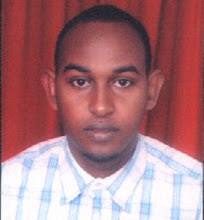(Adopted from the Associated Press) – Jan 26, 2011
MOGADISHU —Aweys Abdullahi Ali has never known a day of peace in Somalia. Gunmen have killed his mother, set his home on fire, driven away his friends. Ali, who is 20, sees no end to the violence.
Young Aweys and his troubled face, no more resilience
Wednesday marks the 20th anniversary of the fall of Siad Barre, Somalia's socialist dictator whose overthrow ushered in years of brutal clan-based conflict. This arid Horn of Africa nation is now home to a generation of people who have known nothing but war. Some have seen neighbors beheaded by al-Qaida linked insurgents or killed in U.S. missile strikes.
"I've woken up to the crack of gunfire ever since I was young," said Ali, a dark-eyed young man with a wisp of a beard. "I never believed Somalia was ever peaceful and I used to wonder what my parents were talking about when told me about the old days."
Ali, like most of Somalia's 8 million citizens, was born after Barre's fall. Even though Barre had his opponents imprisoned and tortured, Ali imagines the dictatorship as a long-vanished golden age compared to the anarchy that is now affecting all of Somalia except for the northern regions of Somaliland and Puntland.
Government forces and al-Qaida linked insurgents have carved up the battle-scarred capital of Mogadishu. Temporary roadblocks, some just rusting barbed wire stretched across the cratered roads, mark constantly shifting front lines.
Gunmen scan the waiting citizens: Are their beards too long? Not long enough? Are that one a spy? What clan are they from? Do they have any money? The lucky passers-by are just told to pay a bribe.
"Once I refused, and they showed me the body of a dead young man and said if I don't pay something they will kill me," Ali recalled.
Not even home is safe. Last year, the gunmen came to rob Ali's neighbors. The woman screamed. Ali's mother ran outside to help. They shot her.
"We rushed her to Medina hospital but she died," Ali recalled. Medina, considered one of the better-equipped hospitals in Mogadishu, is frequently so full of war casualties that the overflow of patients are treated in tents outside.
These days, Ali and his father live in a ruined house near an African Union peacekeeping base. There's no water or electricity. The afternoons are sweltering and dull. There are no jobs. They have no money for school. Those with money fled long ago.
"Imagine being 20 and never having been to school," said Denise Shepherd-Johnson, a spokeswoman for UNICEF. More than two-thirds of Somali children have not completed even primary school, she said.
"Imagine in the future you're asked to run a country and you have no idea what a government even does. Imagine trying to dream when the world of possibilities is so limited you are just trying to survive," she said.
Ali can't picture a better future or remember a better past. He can't imagine the nightclubs his parents described on the Mogadishu beach front or the cool grass of the lawn in their old comfortable house before it was shelled. The old Catholic cathedral, built by Italian colonialists, is roofless and gutted.
Ali doesn't think the war will end anytime soon. Corruption, clan politics and regional rivalries fuel the conflict. Somalia's U.N.-backed administration doesn't account for the cash it's given by foreign donors, then begs them for more. Archenemies Ethiopia and Eritrea fund opposite sides in the conflict. An Islamist insurgent movement called al-Shabab has attracted foreign fighters, some with experience in Afghanistan.
Men and women alike, children and the aged alike, their suffering seems endless
The U.S. and its allies hunt down suspected members of al-Qaida but can't stem the flow of volunteers. They come from Pakistan, Chechnya and even America to join the insurgency. Western intelligence agencies fear Somalia will become a training ground for terrorists like Afghanistan was during the 1990's.
In response, the U.S. and other donors are offering military aid and funding an extra 4,000 African Union peacekeepers to beef up the 8,000 who are already deployed.
What happens next is unclear. The mandate of Somalia's government, which has failed to provide security or services, is due to run out in August. No one knows whether it will be extended.
Even the memory of what a government is supposed to do is fading. New administrations are increasingly forced to draw on the diaspora to fill positions, but many of those who spent years abroad to come back as administrators have no power base in the country and can't enforce their decisions.
"I do not know what a government is or what it does for people," Ali said. The only future he sees is more fighting.
"This war will not end before my son is grown," he said. "And I will be a very old man."
Saturday, February 5, 2011
Friday, February 4, 2011
Muslim brotherhood should take over power in Egypt
Muslim brotherhood should take over power in Egypt. Mubarak is Zionist and should go with Zionists; at least Egyptians are doing the right thing as at now. No body should leave the liberation square until Mubarak resigns.
Subscribe to:
Posts (Atom)
About the author of Sobbing Somali

- Abdullahi Jamaa
- Wajir, Northeastern, Kenya
- Abdullahi Jamaa is a Kenyan freelance journalist with reporting experience especially from the devastated Horn of Africa region. You can contact him by emailing: abdullahijamac@yahoo.co.uk


